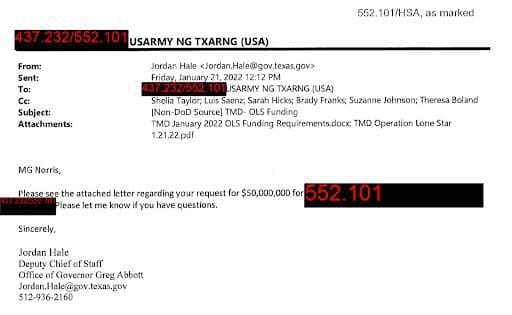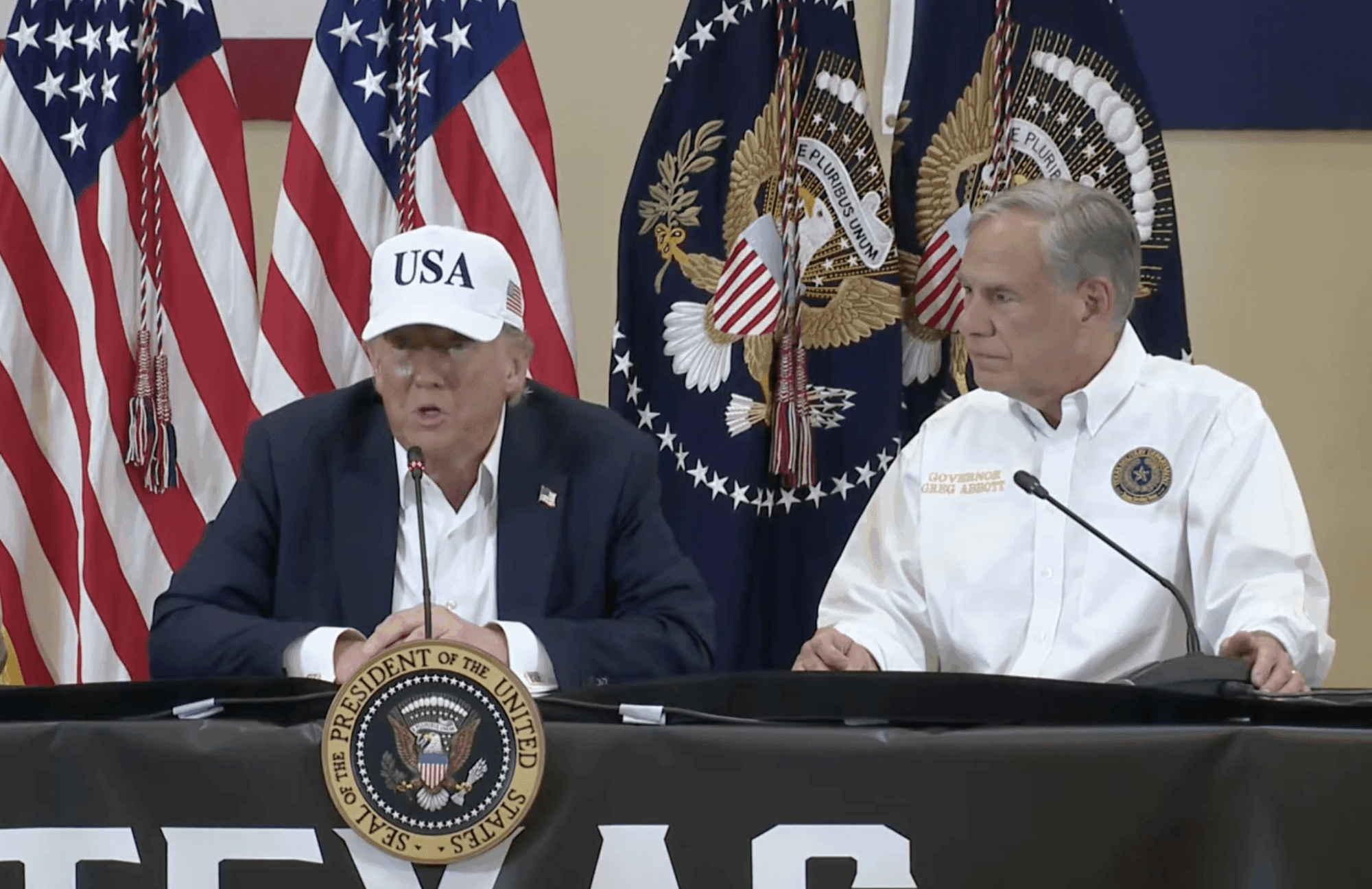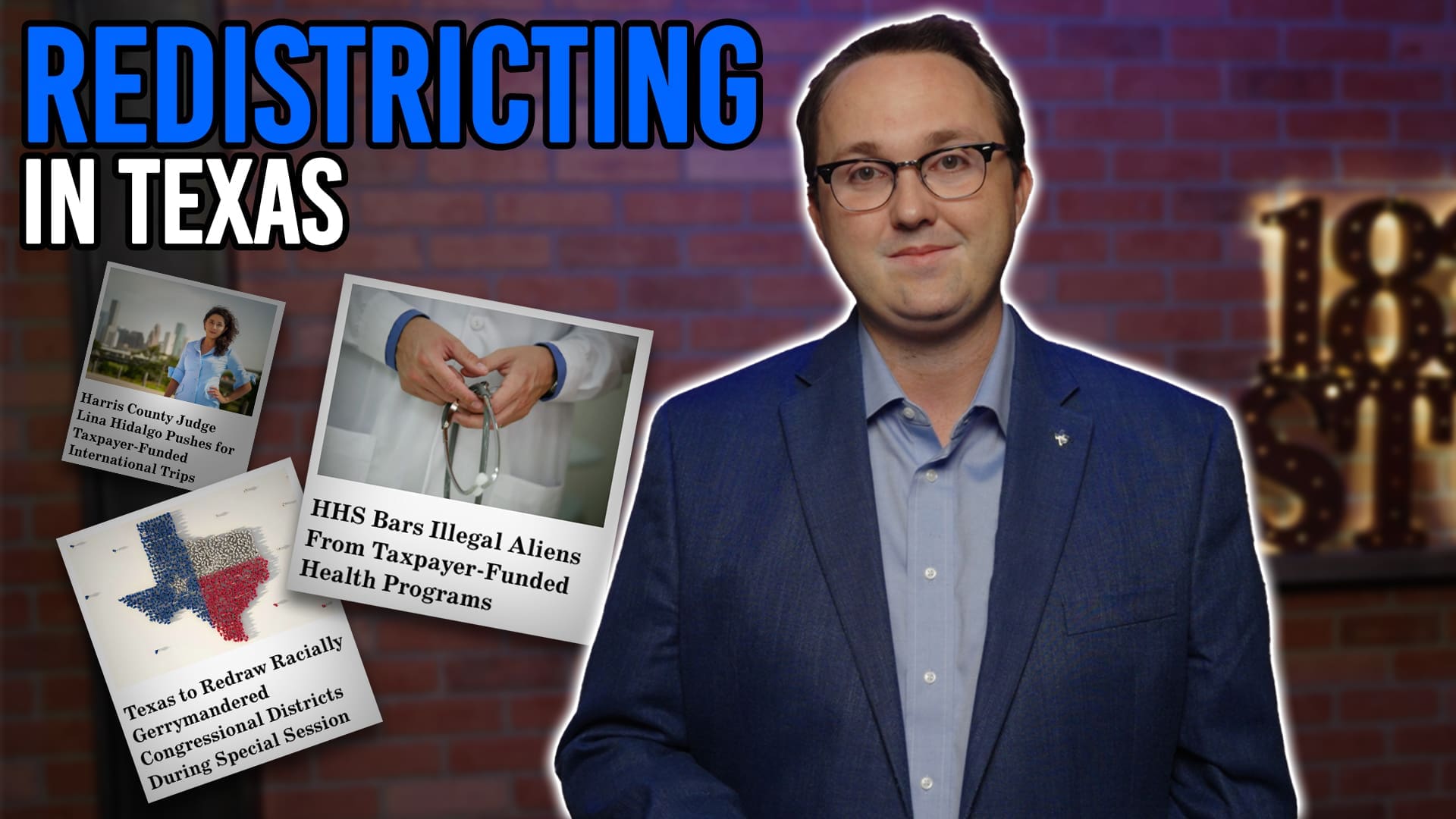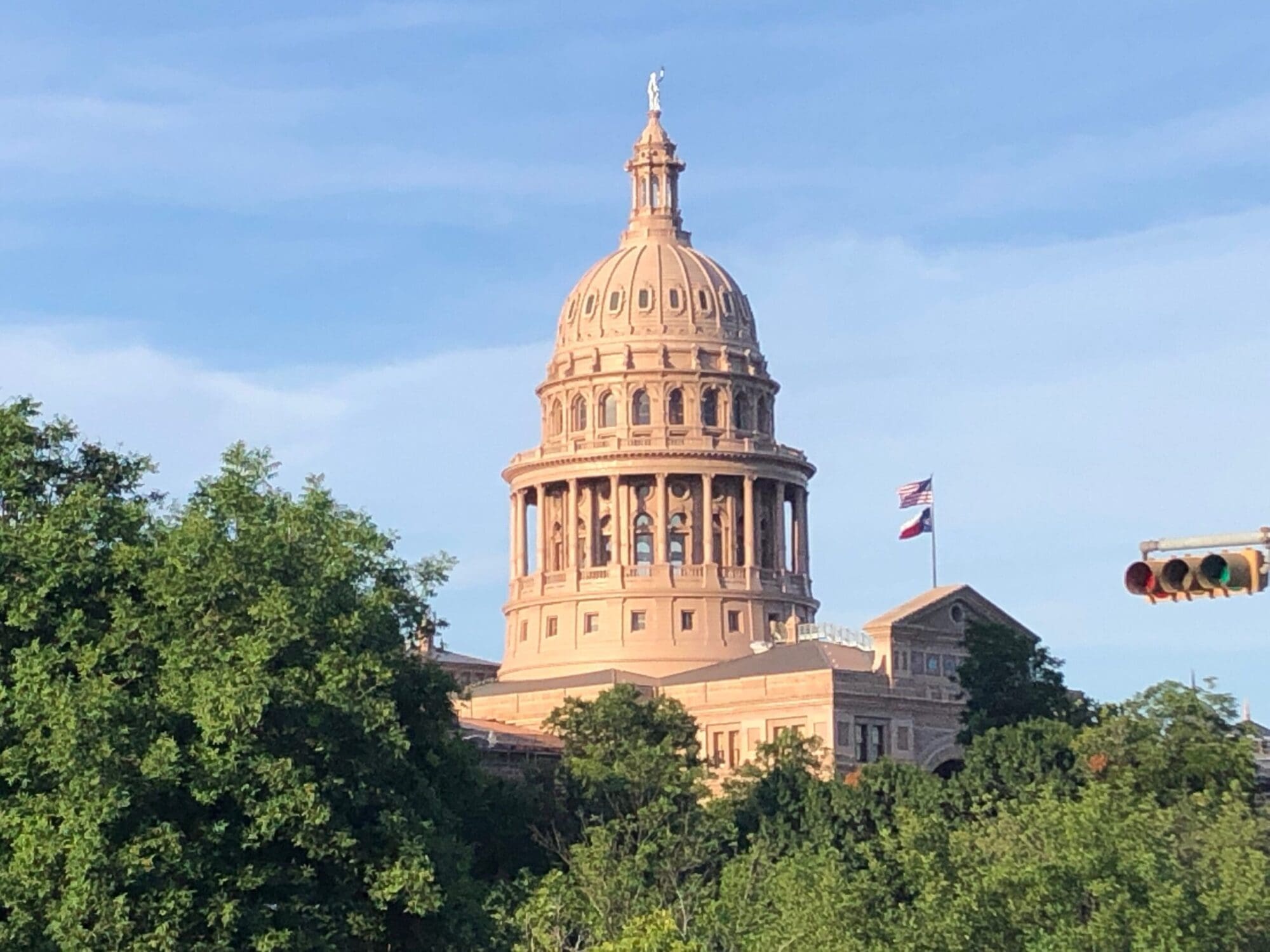When Gov. Greg Abbott turned to the state’s military to conduct a border security operation, multiple problems emerged that exposed how far the state agency had been allowed to decay by state public officials. Problems the taxpayers were billed to fix.
Launched in March 2021, Operation Lone Star (OLS) is Gov. Greg Abbott’s border security operation utilizing the Texas National Guard (TNG). While it didn’t include turning would be illegal immigrants back at the border the mission included arresting law breakers at the border and bussing operations to sanctuary cities.
While the mission garnered headlines and Fox News appearances, as time went on, the Texas Military Department struggled in their attempts to execute Abbott’s operation, and soldiers suffered for it.
Historically, the biggest struggle for the U.S. military—when called to action after decades of inaction—is to train massive numbers of raw citizens for combat, and become an effective fighting force in a short amount of time. Recent American operations in Iraq and Afghanistan, combined with a political focus on transgenderism and critical race theory indoctrination as opposed to maintaining elite status at winning wars, indicate problems within our armed forces are growing despite taxpayer-funding approaching $1 trillion.
This decay appears to be mirrored in our state military as well. As records Texas Scorecard obtained during the course of our investigative work reveal, the Texas Military Department asked for more and more taxpayer monies in an effort to quickly solve problems a well-maintained military would likely not have.
Tapping the Money Hose
My husband … has NOT BEEN PAID! We live in Plano and mortgage/bills aren’t cheap! Get these soldiers paid so we don’t lose our house! We have 2 boys and this is right in the time of Christmas!!!
Those words were written by Cailtin Hagy in a December 1, 2021, email, to State Rep. Matt Shaheen (R–Plano), whose staff reached out to Courtney Hjaltman, the Deputy Legislative Director for Gov. Abbott (R), on the matter. “I know other Freedom Caucus members have received similar emails,” Shaheen wrote to his own staff.
Hjaltman, as it turned out, was already aware of Hagy’s situation. “We have heard and worked to fix this issue and I was told that it had been resolved,” Hjaltman wrote Shaheen’s chief of staff, Antonio Mireles. She asked Mireles for personal ID information for Hagy’s husband so they could resolve it. “We of course agree this is something that needs to be fixed ASAP,” Hjaltman wrote.
Texas Scorecard obtained these communications through an open records request to the Texas Military Department on February 1, 2022. TMD did not deliver them until September 1.
As Texas Scorecard’s investigation into Operation Lone Star (OLS) reported, Hagy’s situation was one of many, and pay wasn’t the only problem plaguing the poorly planned mission. There were also quality of life issues for soldiers, and other issues exposing the dilapidated state of the Texas Military Department.
When it comes to pay, on January 11, 2022, Gov. Abbott claimed “all paycheck issues have been addressed.” Yet within the records Texas Scorecard received was a January 28 email to Jordan Hale, Gov. Abbott’s Deputy Chief of Staff, showing TMD was still dealing with the problem.

Source: Texas Military Department
Part of the Texas Military Department’s response to these, and other problems, was repeatedly asking state officials to increase the flow of the taxpayer money hose to full blast. Records obtained from the Texas Military Department reveal these requests, with the Governor’s Office at one point appearing to put a cap on the increasingly outrageous looking amounts.
The story begins on January 18, 2022, when TMD’s director of state administration, Shelia Bailey Taylor, wrote an email to a “Michael Hull” about OLS’ costs. According to LinkedIn, there is a Michael Hull who serves as Deputy Director Budget & Policy in the Governor’s Office. Taylor wrote about changes made in TMD’s projections for OLS costs. These include prioritization in the budget for spending on “supplies, automation, and equipment to improve quality of life challenges,” and increases in basecamp costs “for new reconfigurations and accommodations to improve quality of life challenges.” Taylor also wrote that OLS payroll was “adjusted … downward,” and that personnel supporting the operation in other statuses would be paid with non-State Active Duty funds. State Active Duty is when members of the Texas National Guard are being paid by state taxpayers for a state mission.
This January 18 letter was a teaser of the coming funding requests, with TMD “expected to be approximately” $480 million to cover “all current costs, adjustments, and projections through” March 31, 2022. On top of that, the email revealed even more money siphons were “planned to be made on a quarterly basis.”
Next came Taylor’s January 21, 2022, letter. This letter shows that on November 1, 2021, the Texas Military Department asked for $2 million in funding. This follows former Texas Adjutant General Tracy Norris’ October request for Texas Comptroller Glenn Hegar’s help in paying soldiers on time.
Taylor’s January 21 letter also revealed that the Texas Military Department later asked for $6.6 million more just days earlier. But now, they asked Hicks and Jerry McGinty, director of the Legislative Budget Board, to forget the two previous requests, and instead asked for more than $4.3 million of taxpayer’s money. According to Taylor’s email to Sarah Hicks, director of the Governor’s Office of Budget, Planning, and Policy, these requests were “IT-related,” and the money would be in excess of what the Legislature had assigned TMD for Fiscal Year 2022 – 2023.
Taylor’s request made it very obvious that the numerous problems the apparently ill-maintained TMD had was the driver for these rising costs. “The requested authority will support TMD’s expenditure of funds in support of the Operation Lone Star Mission, including automation requirements necessary to address quality of life issues for soldiers on the border mission.”
The Legislative Budget Board (LBB), according to the Texas State Directory, “is a permanent joint committee of the Texas Legislature that develops budget and policy recommendations for legislative appropriations, completes fiscal analyses for proposed legislation, and conducts evaluations and reviews to improve the efficiency and performance of state and local operations.” Lt. Gov. Dan Patrick (R) and Speaker of the House Dade Phelan (R) co-chair the five person LBB, and is also comprised of members from the Texas House and Texas Senate.
This wasn’t the only communication asking for more taxpayer monies that day. Jordan Hale, Gov. Abbott’s Deputy Chief of Staff, wrote then-Texas Adjutant General Tracy Norris that the Governor’s Office “agrees to grant” $50 million to the state military “to cover costs associated with” OLS. TMD redacted from Hale’s email what these taxpayer monies would be spent on.

Source: Texas Military Department
Hale added that if TMD is reimbursed “for these expenses through federal or other state sources,” then the state military “shall repay these funds” to the Governor’s office.
Even after approval of this $50 million, a letter dated that same day with the Texas Military Department letterhead was sent to Hale asking for more than $479 million “to fund TMD’s continuing mission at the Southwest Border” through March 31, 2022. Key information was redacted in this letter by TMD: what these funds were paying for, and the individual making the request.

Source: Texas Military Department
This is where Abbott’s office appears to tap the brakes. Hale replied ten days later, stating the Governor’s Office “agrees to grant” more than $224 million to TMD, a little less than half of what was requested. Furthermore, Hale told TMD that the Governor’s Office “requires documentation of expenses for review,” and that any reimbursements received “through federal or other state sources” had to be repaid to the Governor’s Office.
“For too long, state lawmakers have allowed a long leash to TMD with very little accountability,” Jeramy Kitchen, executive director of Texans for Fiscal Responsibility, told Texas Scorecard after reviewing these communications. “With an expanded role for the department itself as a part of OLS, that same long leash should not continue, as the reality is we are talking about billions of taxpayer dollars, with likely more on the way this next legislative session.”
The requests for taxpayer monies from the troubled state military kept coming even after Abbott fired embattled Texas Adjutant General Tracy Norris, and replaced her with Maj. Gen. Thomas Suelzer in March. The following month, Suelzer testified before the Texas Senate Committee on Border Security and said TMD needed an additional $531 million for Operation Lone Star.
Texas Scorecard asked Kitchen if there should be a financial audit of TMD and Operation Lone Star. “Whether there should be an official audit of both OLS and TMD is difficult to say,” he replied. “Reports from members of the TMD as a part of OLS for the last several months certainly serve as a basis for concern and lawmakers should demand accountability in the interest of taxpayers.”
Full Accounting
On March 21, 2022, Texans for Fiscal Responsibility (TFR) reported they found more than $3 billion earmarked for border security operations through 2023—“the most that have ever been appropriated for such purposes in Texas”—with OLS receiving $500 million specifically for additional personnel. In September, the Dallas Morning News reported costs had “topped $4 billion.”
On November 28, Gov. Abbott boasted how Texas had done “more than any state in HISTORY to secure our border.”
State Rep. Matt Schaefer (R–Tyler) agreed, but pointed out what remains undone. “Illegal crossings have exploded despite billions spent. Border is not secure. Time for a sober assessment of strategy. Whole of [Texas] government needs a new approach.”
Kitchen agrees, and believes the Texas Legislature needs to accept responsibility for its part in this matter.
“Effectively, the state Legislature wrote a check for the purposes of enhancing border security via a myriad of methods, but without also simultaneously demanding realistic goalposts from the Governor’s office by which to determine the actual effectiveness of the investment,” he told Texas Scorecard. “In that vein, we believe it is fiscally irresponsible. State lawmakers should demand accountability in the interest of taxpayers.”
Texas Scorecard asked Kitchen what such metrics should look like. He pointed out that border security is a responsibility of the federal government. “Obviously, in the absence of their action, the current situation has created strains on all facets of our state and local governments,” he said. “If the state is to attempt to provide for border security as well, they should also be required to show that efforts have actually curbed things like illegal border crossings and increased violence throughout our communities. Otherwise, these efforts amount to nothing more than campaign stunts.”
There has yet been no full investigation by the Texas Legislature into the myriad problems that Operation Lone Star revealed within the Texas Military Department, including what percentage of spending increases were the result of these problems.
Just as with any government agency, prioritizing proper management and tracking of taxpayer monies by the military has historically not been a high priority. On September 10, 2001, then-Secretary of Defense Donald Rumsfeld complained that the Pentagon’s “financial systems are decades old. According to some estimates we cannot track $2.3 trillion in transactions.” Without a full and transparent investigation, it may not be possible to fully determine how well managed, or mismanaged, state taxpayer monies have been by the Texas Military Department, before, during, and after Operation Lone Star.
In Part 3 of this series, Texas Scorecard will examine the walls the state military built to block transparency and accountability.
This article was updated to correctly attribute the source of obtained records, correcting “expending” to “expected to be,” and accuracy regarding payroll being adjusted downward.
No ads. No paywalls. No government grants. No corporate masters.
Just real news for real Texans.
Support Texas Scorecard to keep it that way!





